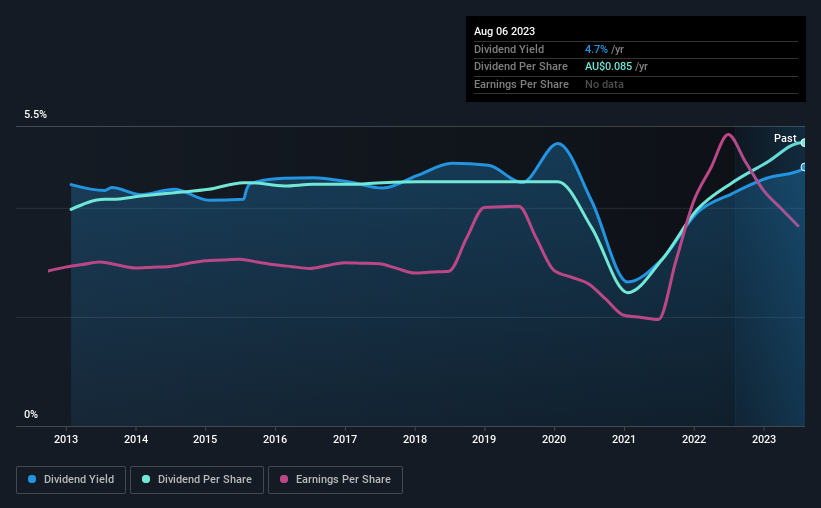Four Days Left Until BKI Investment Company Limited (ASX:BKI) Trades Ex-Dividend
It looks like BKI Investment Company Limited (ASX:BKI) is about to go ex-dividend in the next four days. The ex-dividend date is one business day before a company's record date, which is the date on which the company determines which shareholders are entitled to receive a dividend. The ex-dividend date is of consequence because whenever a stock is bought or sold, the trade takes at least two business day to settle. This means that investors who purchase BKI Investment's shares on or after the 11th of August will not receive the dividend, which will be paid on the 29th of August.
The company's next dividend payment will be AU$0.04 per share. Last year, in total, the company distributed AU$0.085 to shareholders. Last year's total dividend payments show that BKI Investment has a trailing yield of 4.7% on the current share price of A$1.79. We love seeing companies pay a dividend, but it's also important to be sure that laying the golden eggs isn't going to kill our golden goose! That's why we should always check whether the dividend payments appear sustainable, and if the company is growing.
View our latest analysis for BKI Investment
Dividends are typically paid from company earnings. If a company pays more in dividends than it earned in profit, then the dividend could be unsustainable. It paid out 82% of its earnings as dividends last year, which is not unreasonable, but limits reinvestment in the business and leaves the dividend vulnerable to a business downturn. We'd be concerned if earnings began to decline.
When a company paid out less in dividends than it earned in profit, this generally suggests its dividend is affordable. The lower the % of its profit that it pays out, the greater the margin of safety for the dividend if the business enters a downturn.
Click here to see how much of its profit BKI Investment paid out over the last 12 months.
Have Earnings And Dividends Been Growing?
Companies with consistently growing earnings per share generally make the best dividend stocks, as they usually find it easier to grow dividends per share. If earnings decline and the company is forced to cut its dividend, investors could watch the value of their investment go up in smoke. This is why it's a relief to see BKI Investment earnings per share are up 4.1% per annum over the last five years.
We'd also point out that BKI Investment issued a meaningful number of new shares in the past year. It's hard to grow dividends per share when a company keeps creating new shares.
The main way most investors will assess a company's dividend prospects is by checking the historical rate of dividend growth. In the last 10 years, BKI Investment has lifted its dividend by approximately 2.7% a year on average. It's encouraging to see the company lifting dividends while earnings are growing, suggesting at least some corporate interest in rewarding shareholders.
To Sum It Up
Has BKI Investment got what it takes to maintain its dividend payments? BKI Investment has been generating some growth in earnings per share while paying out more than half of its earnings to shareholders in the form of dividends. We're unconvinced on the company's merits, and think there might be better opportunities out there.
If you want to look further into BKI Investment, it's worth knowing the risks this business faces. For example, we've found 3 warning signs for BKI Investment that we recommend you consider before investing in the business.
A common investing mistake is buying the first interesting stock you see. Here you can find a full list of high-yield dividend stocks.
Have feedback on this article? Concerned about the content? Get in touch with us directly. Alternatively, email editorial-team (at) simplywallst.com.
This article by Simply Wall St is general in nature. We provide commentary based on historical data and analyst forecasts only using an unbiased methodology and our articles are not intended to be financial advice. It does not constitute a recommendation to buy or sell any stock, and does not take account of your objectives, or your financial situation. We aim to bring you long-term focused analysis driven by fundamental data. Note that our analysis may not factor in the latest price-sensitive company announcements or qualitative material. Simply Wall St has no position in any stocks mentioned.

